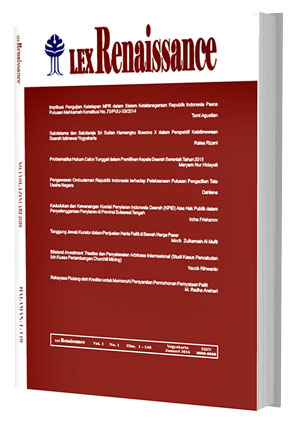Main Article Content
Abstract
This study aims to analyze the legal status of implementing regulations for the Law after the Law gets annulled by the Constitutional Court, whether implementing the regulation still legally binding? This is a normative juridical legal research. The collection of legal materials is carried out through literature review, both primary and secondary legal materials. The results of this study conclude that the implementing regulations of the Law after the Law gets annulled by the Constitutional Court are no longer legally binding. This is because the Law, articles, or paragraphs that form the legal basis for the formation of the Implementing Regulations have been revoked or declared contradicting the 1945 Constitution of the Republic of Indonesia. Therefore, implementing regulations which contain material to implement the Law properly are also deemed contradictory with the 1945 Constitution of the Republic of Indonesia, it is on this basis that the Implementing Regulations are declared to no longer have binding legal force.
Keywords
Article Details
Authors who publish with this journal agree to the following terms:
a. Authors retain copyright and grant the journal right of first publication with the work simultaneously licensed under a Creative Commons Attribution License that allows others to share the work with an acknowledgement of the work's authorship and initial publication in this journal.
b. Authors are able to enter into separate, additional contractual arrangements for the non-exclusive distribution of the journal's published version of the work (e.g., post it to an institutional repository or publish it in a book), with an acknowledgement of its initial publication in this journal.
c. Authors are permitted and encouraged to post their work online (e.g., in institutional repositories or on their website) prior to and during the submission process, as it can lead to productive exchanges, as well as earlier and greater citation of published work (See The Effect of Open Access).References
- Buku
- Achmad Rubaie, H., Putusan Ultra petita Mahkamah Konstitusi, perspektif filosofis, teoritis, dan yuridis, LaksBang PERSSindo, Yogyakarta, 2017.
- Bachtiar, Problematika Implementasi Putusan Mahkamah Konstitusi Pada Pengujian Undang-Undang Terhadap UUD, Raih Asa Sukses, Jakarta, 2015.
- Darwis, Muhammad, “Review of Indonesian Constitutional Court Decision Number 21-22/Puu-V/2007 Based On The Inclusive Legal Theory”, Prophetic Law Review, Vol.1, Issue 1, 2019.
- Faisal Sulaiman, King, Teori Peraturan Perundang-Undangan dan Aspek Pengujiannya, Thafa Media, Yogyakarta, 2017.
- Farida Indrati S., Maria, Ilmu Perudang-Undangan “Proses dan Teknik Pembentukannya”, Kansius, Yogyakarta, 2006.
- Fajar ND., Mukti, & Yulianto Achmad, Dualisme Penelitian Hukum Normatif dan Empris, Pustaka Pelajar, Yogyakarta, 2017.
- Huda, Ni’matul, Kekuatan Eksekutorial Putusan Mahkamah Konstitusi, FH.UII PRESS, Yogyakarta, 2018.
- Huda, Ni’matul, et.al., “Legal Status of Ratified International Treaty under Indonesian Hierarchy of Law”, Conference Proceedings, 8th Asian Constitutional Law Recent Developments and Trends, Vietnam National University, Hanoi, 2019.
- Kelsen, Hans, Teori Umum Tentang Hukum dan Negara, Terjemahan Buku General Theory of Law and State, Nusa Media, Bandung, 2016.
- Lailam, Tanto, Teori dan Hukum Perundang-undangan, Pustaka Pelajar, Yogyakarta, 2017
- Martitah, Mahkamah Konstitusi Dari Negative Legislature Ke Positive Legislature, Konpres, Jakarta, 2013.
- Rasyid Tahlib, Abdul, Wewenang Mahkamah Konstitusi dan Implikasinya dalam Sistem Ketatanegaraan Indonesia, Cita Aditya Bakti, Bandung, 2006.
- Jurnal
- Ikhsan Fatah Yasin, “Keadilan Substantif Dalam Ultra Petita Putusan Mahkamah Konstitusi”, Jurnal Islamica, Volume 15, No. 1 Juni Tahun, 2018.
- Peraturan Perundang-Undangan
- Undang-Undang Dasar Negara Republik Indonesia Tahun 1945.
- Undang-Undang Nomor 12 Tahun 2011 Tentang Pembentukan Peraturan Perundang-Undangan.
- Undang-Undang 7 Tahun 2004 Tentang Sumber Daya Air.
- Undang-Undang 17 Tahun 2019 Tentang Sumber Daya Air.
- Putusan Pengadilan
- Putusan MK-RI No. 058-059-060-063/PUU-II/2004 dan No. 008/PUU-III/2005 Tentang PUU No. 07 Tahun 2004 Tentang Sumber Daya Air.
- Putusan MK-RI No. 85/PUU-XI/2013 Tentang PUU No 07 Tahun 2004 Tentang Sumber Daya Air
- Putusan MK-RI No. 28/PUU-XI/2013 Tentang PUU No. 17 Tahun 2012 tentang Perkoperasian.
- Putusan MK-RI No 001-021-022/PUU-I/2003 Tentang PUU No 20 Tahun 2002 tentang Ketenagalistrikan
References
Buku
Achmad Rubaie, H., Putusan Ultra petita Mahkamah Konstitusi, perspektif filosofis, teoritis, dan yuridis, LaksBang PERSSindo, Yogyakarta, 2017.
Bachtiar, Problematika Implementasi Putusan Mahkamah Konstitusi Pada Pengujian Undang-Undang Terhadap UUD, Raih Asa Sukses, Jakarta, 2015.
Darwis, Muhammad, “Review of Indonesian Constitutional Court Decision Number 21-22/Puu-V/2007 Based On The Inclusive Legal Theory”, Prophetic Law Review, Vol.1, Issue 1, 2019.
Faisal Sulaiman, King, Teori Peraturan Perundang-Undangan dan Aspek Pengujiannya, Thafa Media, Yogyakarta, 2017.
Farida Indrati S., Maria, Ilmu Perudang-Undangan “Proses dan Teknik Pembentukannya”, Kansius, Yogyakarta, 2006.
Fajar ND., Mukti, & Yulianto Achmad, Dualisme Penelitian Hukum Normatif dan Empris, Pustaka Pelajar, Yogyakarta, 2017.
Huda, Ni’matul, Kekuatan Eksekutorial Putusan Mahkamah Konstitusi, FH.UII PRESS, Yogyakarta, 2018.
Huda, Ni’matul, et.al., “Legal Status of Ratified International Treaty under Indonesian Hierarchy of Law”, Conference Proceedings, 8th Asian Constitutional Law Recent Developments and Trends, Vietnam National University, Hanoi, 2019.
Kelsen, Hans, Teori Umum Tentang Hukum dan Negara, Terjemahan Buku General Theory of Law and State, Nusa Media, Bandung, 2016.
Lailam, Tanto, Teori dan Hukum Perundang-undangan, Pustaka Pelajar, Yogyakarta, 2017
Martitah, Mahkamah Konstitusi Dari Negative Legislature Ke Positive Legislature, Konpres, Jakarta, 2013.
Rasyid Tahlib, Abdul, Wewenang Mahkamah Konstitusi dan Implikasinya dalam Sistem Ketatanegaraan Indonesia, Cita Aditya Bakti, Bandung, 2006.
Jurnal
Ikhsan Fatah Yasin, “Keadilan Substantif Dalam Ultra Petita Putusan Mahkamah Konstitusi”, Jurnal Islamica, Volume 15, No. 1 Juni Tahun, 2018.
Peraturan Perundang-Undangan
Undang-Undang Dasar Negara Republik Indonesia Tahun 1945.
Undang-Undang Nomor 12 Tahun 2011 Tentang Pembentukan Peraturan Perundang-Undangan.
Undang-Undang 7 Tahun 2004 Tentang Sumber Daya Air.
Undang-Undang 17 Tahun 2019 Tentang Sumber Daya Air.
Putusan Pengadilan
Putusan MK-RI No. 058-059-060-063/PUU-II/2004 dan No. 008/PUU-III/2005 Tentang PUU No. 07 Tahun 2004 Tentang Sumber Daya Air.
Putusan MK-RI No. 85/PUU-XI/2013 Tentang PUU No 07 Tahun 2004 Tentang Sumber Daya Air
Putusan MK-RI No. 28/PUU-XI/2013 Tentang PUU No. 17 Tahun 2012 tentang Perkoperasian.
Putusan MK-RI No 001-021-022/PUU-I/2003 Tentang PUU No 20 Tahun 2002 tentang Ketenagalistrikan




